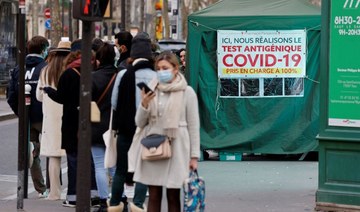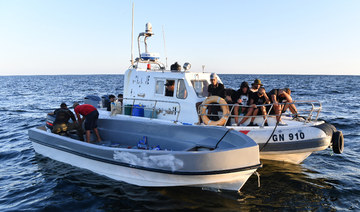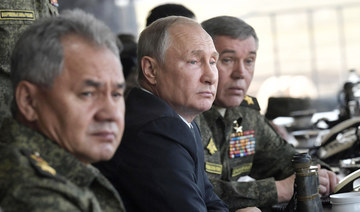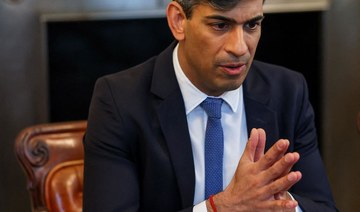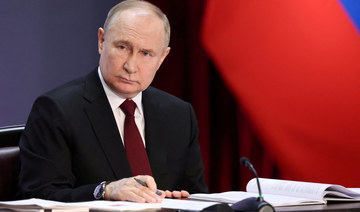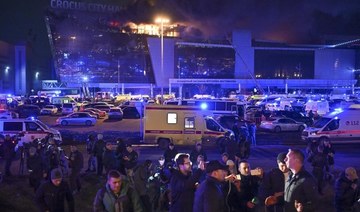ROME: To mask or not to mask is a question Italy settled early in the COVID-19 outbreak with a vigorous “yes.” Now the onetime epicenter of the pandemic in Europe hopes even stricter mask rules will help it beat the latest infection surge.
Other countries are taking similar action as the more transmissible — yet, apparently, less virulent — omicron variant spreads through the continent.
With Italy’s hospital ICUs rapidly filling with mostly unvaccinated COVID-19 patients, the government announced on Christmas Eve that FFP2 masks — which offer users more protection than cloth or surgical masks — must be worn on public transport, including planes, trains, ferries and subways.
That’s even though all passengers in Italy, as of this week, must be vaccinated or recently recovered from COVID-19. FFP2s also must now be worn at theaters, cinemas and sports events, indoors or out, and can’t be removed even for their wearers to eat or drink.
Italy re-introduced an outdoor mask mandate. It had never lifted its indoor mandate — even when infections sharply dropped in the summer.
On a chilly morning in Rome this week, Lillo D’Amico, 84, sported a wool cap and white FFP2 as he bought a newspaper at his neighborhood newsstand.
“(Masks) cost little money, they cost you a small sacrifice,” he said. “When you do the math, it costs far less than hospitalization.”
When he sees someone from the unmasked minority walking by, he keeps a distance. “They see (masks) as an affront to their freedom,’’ D’Amico said, shrugging.
Spain reinstated its outdoor mask rule on Christmas Eve. After the 14-day contagion rate soared to 2,722 new infections per 100,000 people by the end of last week — from 40 per 100,000 in mid-October — Prime Minister Pedro Sanchez was asked whether the outdoor mask mandate was helping.
“Of course, it is. It’s not me saying it. It’s science itself saying it because (it’s) a virus that is contracted when one exhales,’’ Sanchez said.
Portugal brought masks back at the end of November, after having largely dropped the requirement when it hit its goal of vaccinating 86 percent of the population.
Greece has also restored its outdoor mask mandate, while requiring an FFP2 or double surgical mask on public transport and in indoor public spaces.
This week the Dutch government’s outbreak management team recommended a mask mandate for people over 13 in busy public indoor areas such as restaurants, museums and theaters, and for spectators at indoor sports events. Those places are currently closed under a lockdown until at least Friday, Jan. 14.
In France, the outdoor mask mandate was partially re-instated in December in many cities, including Paris. The age for children to start wearing masks in public places was lowered to 6 from 11.
Austrian Chancellor Karl Nehammer announced last week that people must wear FFP2 masks outdoors if they can’t keep at least two meters (6.5 feet) apart.
In Italy, with more than 2 million people currently positive for the virus in a nation of 60 million and workplace absences curtailing train and bus runs, the government also sees masks as a way to let society more fully function.
People with booster shots or recent second vaccine doses can now avoid quarantine after coming into contact with an infected person if they wear a FFP2 mask for 10 days.
The government has ordered shops to make FFP masks available for 75 euro cents (85 US cents). In the pandemic’s first year, FFP2s cost up to 10 euros ($11.50) — whenever they could be found.
Italians wear them in a palette of colors. The father of a baby baptized this week by Pope Francis in the Sistine Chapel wore one in burgundy, with matching tie and jacket pocket square. But the pontiff, who has practically shunned a mask in public, was mask-less.
On Monday, Vatican City State mandated FFP2s in all indoor places. The tiny, walled independent state across the Tiber from the heart of Rome also stipulated that Vatican employees can go to work without quarantining after coming into contact with someone testing positive if, in addition to being fully vaccinated or having received a booster shot, they wear FFP2s.
Francis did appear to be wearing a FFP2 when, startling shoppers in Rome on Tuesday evening, he emerged from a music store near the Pantheon before being driven back to the Vatican.
In Britain, where Prime Minister Boris Johnson has focused on vaccination, masks have never been required outdoors.
This month, though, the government said secondary school students should wear face coverings in class. But Education Secretary Nadhim Zahawi said that rule wouldn’t apply “for a day longer than necessary.”
When the British government lifted pandemic restrictions in July 2021, turning mask-wearing from a requirement to a suggestion, mask use fell markedly.
Nino Cartabellotta, president of the Bologna-based GIMBE foundation, which monitors health care in Italy, says Britain points to what can happen when measures like mask-wearing aren’t valued.
“The situation in the U.K, showed that use of vaccination alone wasn’t enough” to get ahead of the pandemic, even though Britain was one of the first countries to begin vaccination, he said in a video interview.
Masks rules get tighter in Europe in winter’s COVID-19 wave
https://arab.news/2ru2g
Masks rules get tighter in Europe in winter’s COVID-19 wave
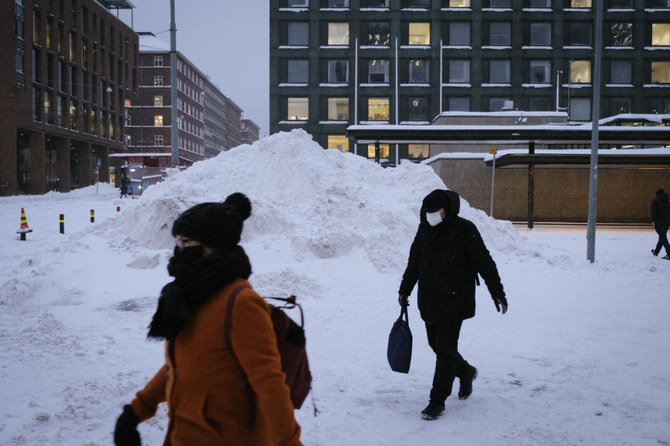
- Italy re-introduced an outdoor mask mandate
- Spain reinstated its outdoor mask rule on Christmas Eve
Rights concerns, costs undermine Turkiye-EU migrant deal, say auditors
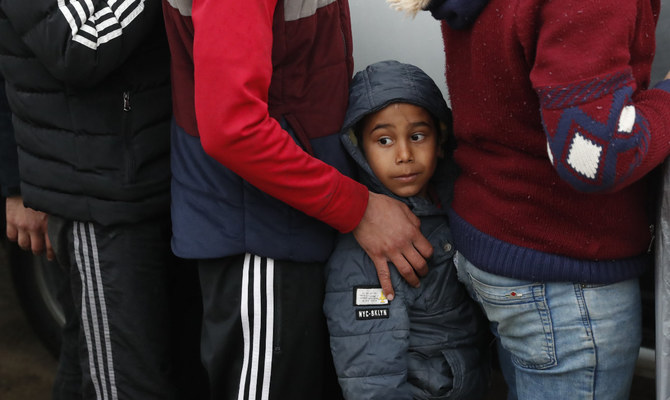
- EU Ombudsman Emily O’Reilly has launched an inquiry into human rights guarantees under the bloc’s new migration deal with Tunisia
BRUSSELS: Turkiye’s poor human rights record and economic factors are undermining the effectiveness of the European Union’s migration deal with Ankara, EU auditors said on Wednesday.
Under the 2016 deal, Ankara agreed to take back migrants who had crossed from its territory to Europe in return for EU aid to help fund more than four million refugees on Turkish soil.
The EU, which faces elections in June for the European Parliament in which illegal migration promises to be a big issue, has sealed agreements similar to the Turkiye scheme with Tunisia, Egypt, Mauritania and others.
In their report, the EU auditors raised concerns about the ability of non-governmental organizations (NGOs) to operate projects, as envisaged under the 6 billion euro ($6.4 billion) deal, given Turkiye’s authoritarian turn since a failed coup in 2016 and its crackdown on dissent.
“The operating situation of NGOs has continuously deteriorated since 2015 and has been exacerbated in the context of the unsuccessful... coup in Turkiye, where NGOs subsequently were targeted through various legislation,” it said.
The European Court of Auditors (ECA) report also cited the difficulty of managing the EU aid in the context of Turkiye’s economic downturn and Ankara’s “backsliding on the rule of law and fundamental rights.”
The report said the European Commission, the EU’s executive, had failed to provide an adequate analysis of costs and that it was unclear what would happen once the aid ended.
“The facility is beneficial for refugees and host communities but we would still like to see improvements in terms of demonstrating impact, ensuring sustainability, and value for money,” said Bettina Jakobsen, who led the ECA report.
Rights groups and some politicians have long accused the EU of neglecting human rights in its drive to curb illegal migration.
“This leads to the EU focusing less on issues that should be of relevance such as the neglect of human rights,” said Florian Trauner, a professor at the Brussels School of Governance.
EU Ombudsman Emily O’Reilly has launched an inquiry into human rights guarantees under the bloc’s new migration deal with Tunisia.
US, Russia set for a showdown at UN over nuclear weapons in space
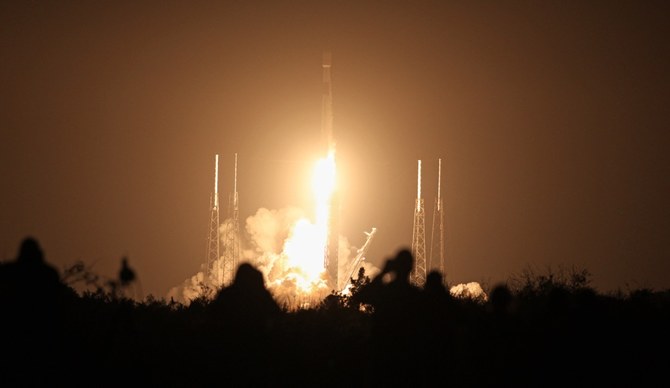
- The White House says Russia has not yet deployed such a weapon.
UNITED NATIONS/WASHINGTON: The United States and Russia are set to face off over nuclear weapons in space on Wednesday at the United Nations Security Council, which is due to vote on a US-drafted resolution calling on countries to prevent an arms race in outer space.
Russia is expected to block the draft resolution, said some diplomats. The US move comes after it accused Moscow of developing an anti-satellite nuclear weapon to put in space, an allegation that Russia’s defense minister has flatly denied.
US Ambassador to the UN Linda Thomas-Greenfield and Japan’s UN Ambassador Yamazaki Kazuyuki said in a joint statement on Friday that they have been negotiating with Security Council members on the draft text for six weeks.
The text affirms the obligation of states to comply with the Outer Space Treaty and calls on countries “to contribute actively to the objective of the peaceful use of outer space and of the prevention of an arms race in outer space.”
The 1967 Outer Space Treaty bars signatories – including Russia and the United States – from placing “in orbit around the Earth any objects carrying nuclear weapons or any other kinds of weapons of mass destruction.”
Russia and China are planning to first put an amendment to a vote in the council. The amendment echoes a 2008 proposal by the pair for a treaty banning “any weapons in outer space” and threats “or use of force against outer space objects.”
The amendment is not expected to be adopted, said diplomats. The amendment and the draft resolution each require at least nine votes in favor and no vetoes by Russia, China, the United States, Britain or France to be adopted.
“Without our amendment, based on the General Assembly resolution adopted in December 2023, the text tabled by the US will be unbalanced, harmful and politicized,” deputy Russian UN Ambassador Dmitry Polyanskiy told Reuters, adding that it would also undermine the Outer Space Treaty legal regime.
Polyanskiy said “all questions relating to this sphere should be considered by the full membership of States Parties to this Treaty and not by the UN Security Council members only.”
US intelligence officials, according to three people familiar with their findings, believe the Russian capability to be a space-based nuclear bomb whose electromagnetic radiation if detonated would disable vast networks of satellites.
White House National Security Council spokesman John Kirby has said Russia has not yet deployed such a weapon.
Russian President Vladimir Putin said in February that Russia was against the deployment of nuclear weapons in space.
Governments have increasingly viewed satellites in Earth’s orbit as crucial assets that enable an array of military capabilities on Earth, with space-based communications and satellite-connected drones in the war in Ukraine serving as recent examples of the outsized role of space in modern warfare.
Russia invaded neighboring Ukraine in February 2022.
Google fires at least 20 more workers who protested its $1.2bn contract with Israel
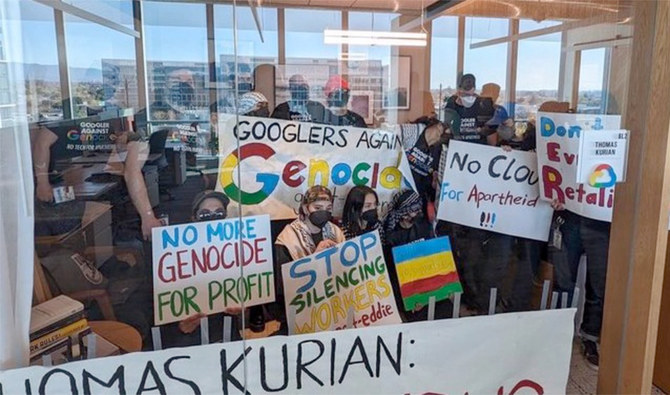
NEW YORK: Google fired at least 20 more workers in the aftermath of protests over technology the company is supplying the Israeli government amid the Gaza war, bringing the total number of terminated staff to more than 50, a group representing the workers said.
It’s the latest sign of internal turmoil at the tech giant centered on “Project Nimbus,” a $1.2 billion contract signed in 2021 for Google and Amazon to provide the Israeli government with cloud computing and artificial intelligence services.
Workers held sit-in protests last week at Google offices in New York and Sunnyvale, California. The company responded by calling the police, who made arrests.
The group organizing the protests, No Tech For Apartheid, said the company fired 30 workers last week — higher than the initial 28 they had announced.
Then, on Tuesday night, Google fired “over 20” more staffers, “including non-participating bystanders during last week’s protests,” said Jane Chung, a spokeswoman for No Tech For Apartheid, without providing a more specific number.
“Google’s aims are clear: the corporation is attempting to quash dissent, silence its workers, and reassert its power over them,” Chung said in a press release. “In its attempts to do so, Google has decided to unceremoniously, and without due process, upend the livelihoods of over 50 of its own workers.”
Google said it fired the additional workers after its investigation gathered details from coworkers who were “physically disrupted” and it identified employees who used masks and didn’t carry their staff badges to hide their identities. It didn’t specify how many were fired.
The company disputed the group’s claims, saying that it carefully confirmed that “every single one of those whose employment was terminated was personally and definitively involved in disruptive activity inside our buildings.”
The Mountain View, California, company had previously signaled that more people could be fired, with CEO Sundar Pichai indicati ng in a blog post that employees would be on a short leash as the company intensifies its efforts to improve its AI technology.
Britain’s home secretary touts UK-Rwanda migrant deportation deal during visit to Italy
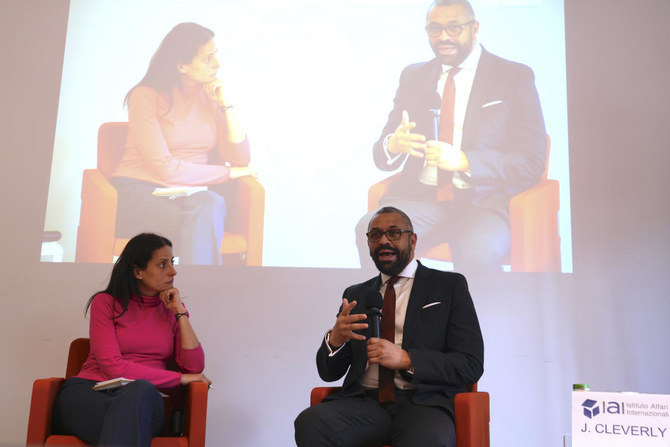
- Deal, in which Britain will pay Rwanda to process the migrants, is aimed at deterring people from crossing the English Channel from France
- It is similar in some basic aspects to Italy’s controversial pact to outsource the processing of asylum-seekers to Italian-run centers in Albania
ROME: Britain’s home secretary on Tuesday touted Britain’s migrant deportation deal with Rwanda as a “new and creative” deterrent to an old and growing problem. But he said he took seriously criticism by the UN refugee agency that it violates international law.
Home Secretary James Cleverly visited Italy, ground zero in Europe’s migration debate, hours after the UK Parliament approved legislation to enable the government to deport some people to Rwanda who enter Britain illegally.
The deal, in which Britain will pay Rwanda to process the migrants, is aimed at deterring people from crossing the English Channel from France. It is similar in some basic aspects to Italy’s controversial pact to outsource the processing of asylum-seekers to Italian-run centers in Albania.
Human rights groups have said both deals, forged by conservative governments amid anti-migrant sentiment among voters, violate the rights of migrants that are enshrined in international refugee conventions.
On Tuesday, the UN High Commissioner for Refugees said the UK-Rwanda deal is “not compatible with international refugee law” because it uses an asylum model “that undermines global solidarity and the established international refugee protection system.”
Cleverly defended the deal as a necessary response to a problem that has outgrown the international institutional way of processing migrants. He said Britain will not tolerate people smugglers determining who arrives on British soil.
“People-smuggling mass migration has changed (and) I think demands us to be constantly innovating,” he told a gathering at the Institute of International Affairs, a Rome-based think tank.
He said he took seriously the UNCHR criticism and said Britain was a law-abiding country.
“Of course we will respect the UN enormously,” he said when asked about the UNHCR criticism. “We take it very, very seriously. Doesn’t mean to say we always agree with their assessment. But we will, of course, look at that.”
Cleverly visited the Italian coast guard headquarters on Tuesday and on Wednesday is to visit the Sicilian island of Lampedusa, where tens of thousands of migrants have arrived after crossing the Mediterranean Sea on boats setting off from northern Africa.
Lampedusa is closer to Africa than the Italian mainland and is often the destination of choice for migrants, whose numbers reached 157,652 new arrivals in Italy last year.
The numbers arriving in Italy so far this year are actually way down, presumably thanks to Italy’s European Union-endorsed agreement with Tunisia to stem departures. As of Tuesday, 16,090 migrants had arrived by sea in Italy so far this year, compared to 36,324 in this period last year.
Spain has actually outpaced Italy so far this year in terms of migrant sea arrivals, with 16,621 arriving this year as of April 15, the last available date.
In Britain, the numbers pale in comparison to the southern Mediterranean, even during peak periods: In 2022, the number of people arriving in Britain from across the Channel reached 45,774, though last year the number dropped to 29,437.
Ukraine suspends consular services abroad for men of fighting age

- Ukraine’s foreign affairs ministry “announced a temporary suspension of accepting new applications for consular services” for men between 18 and 60
- It made an exception for documents allowing Ukrainians to return to Ukraine
KYIV: Ukraine authorities on Tuesday suspended consular services for men of fighting age living abroad, after announcing measures to bring them home amid manpower shortages in the army fighting Russia.
Ukraine’s army has been struggling to hold frontlines, partly due to a lack of soldiers over two years into Russia’s invasion.
Ukraine’s foreign affairs ministry “announced a temporary suspension of accepting new applications for consular services” for men between 18 and 60.
It made an exception for documents allowing Ukrainians to return to Ukraine.
The move would likely oblige Ukrainian men to return from abroad to undergo administrative procedures that were previously available abroad.
The government has already adopted a mobilization law, due to come into force on May 18, that toughens penalties against draft dodgers and obliges men to keep their military registration up-to-date.
The ministry said men would be able to access consular services once the law came into force and “after updating their military registration.”
“Male citizen of Ukraine aged 18 to 60 with valid military registration documents will have full access to consular services,” the ministry said.
Ukrainian men have been forbidden to leave the country since the invasion began, apart from a few exceptions.
But some lived away before the war began, and Ukrainian media estimates that thousands more illegally fled the country.




